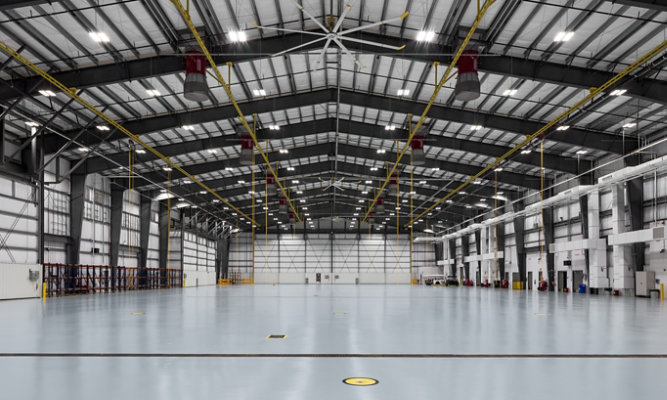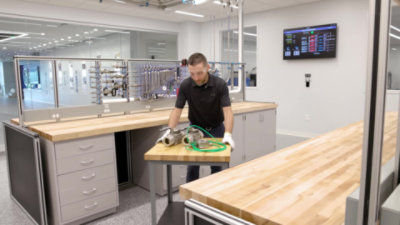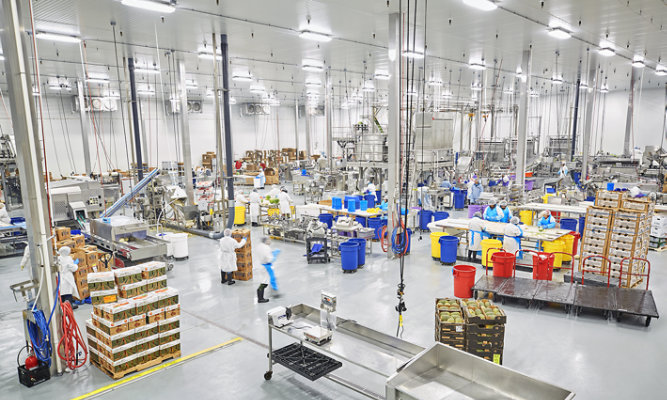Car Battery Plant Design: Considerations for Floors
Electric vehicle (EV) battery manufacturing and production facilities must be designed with unique construction considerations in mind. The concrete floors in EV battery plants are subjected to impact, abrasion, chemical attack, moisture, wear and tear, AGV traffic and more that can damage the substrate and potentially halt operations. Additionally, without proper coatings in place, the floors can contribute to the build up of static electricity that can harm delicate electrical systems and cause unsafe conditions.
Connect with a Local Expert to Learn More
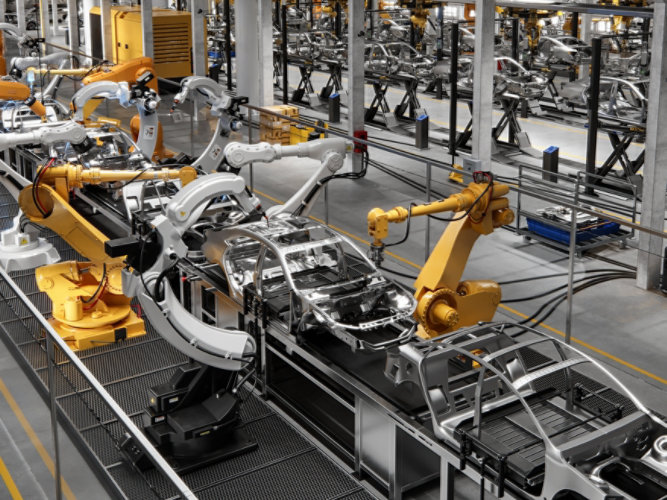
Installing protective concrete coating systems is a critically important part of maintaining a safe and productive EV battery facility flooring environment. Choose flooring solutions that meet the specific needs of your EV battery manufacturing plant to ensure they provides optimal protection.
9 Factors for Specifying Floors for a Car Battery Plant
When it’s time to find protective flooring systems for your EV battery plant, there are several environmental concerns and use conditions you must consider in order to design an effective solution.
1. Budget and Lifecycle Expectations
Your budget will influence your options for EV battery facility floor coating products and systems.
Resinous floor coatings are generally available in three categories, grouped by thickness level: Thin-mil floor coating (thin), slurry floor coating (thicker) and mortar floor coating (thickest). Thickness directly correlates to the service life of the flooring system, with industry consensus estimating that thinner products last up to five years, thicker options range from 10 to 15 years and the thickest coatings have a lifespan of 20 to 30 years or more.
Costs vary based on thickness and lifecycle. If you are looking for an EV battery plant flooring system that has a longer lifecycle and higher durability, expect the price to rise alongside thickness and lifespan levels. Thinner coatings, depending on their usage, may not last as long, and the topcoat will have to be replaced within a few years.
2. Conditions of Use
Consider the area of the EV battery facility you are constructing. What are the expected conditions of use? Is it a low-traffic or high-traffic area? Is the flooring at risk of abrasions or (dragging or scratching) or impacts (dropping objects)? The answers to these questions will determine the level of durability and resistance needed for the floor coating solution.
Another factor to examine is if the space involves the use of explosive or highly flammable commodities. In these areas, the discharge of static electricity is extremely dangerous. Even walking across the floor and touching a doorknob can cause a spark. Applying a resinous floor coating with static control properties will help protect sensitive equipment from electric shock that could ignite the invisible, odorless and explosive gases in EV battery production and manufacturing spaces.
3. Forklifts
What types of forklifts are used in your EV battery plant? If you use automated guided vehicles (AGVs) that travel autonomously throughout the warehouse, distribution center or manufacturing facility, there are a few flooring considerations to keep in mind.
AGVs are guided by GPS or other systems through an area, so the type of flooring becomes very critical in spaces where they operate. These vehicles require floors that are extremely flat, smooth and long-wearing — it’s important to consider how your floor coating system will support their movement.
4. Concrete Slab Grade and Waterproofing
The slab grade of the concrete floor in question is also relevant because it determines what type of waterproofing is required.
On-grade concrete slabs are cast directly on the ground, which means there is a risk of moisture permeating through the concrete. The moisture vapor can then damage the substrate, creating hazardous working conditions, or increase the relative humidity levels in the air, destroying delicate equipment. If the concrete is on-grade slab, you need to install a moisture vapor barrier when the concrete is poured.
Above-grade concrete slabs are not in contact with the ground because they are elevated (typically on another level of the facility). Since they are above the ground, they may not need a moisture vapor barrier, but depending on how the space is used, they may require additional waterproofing. Will the space be washed down? Is the floor sloped to the drain? Do you need to prevent the chance of water leaking into the occupied space below? If so, look for a floor coating system that is waterproof and leakproof.

See EV Battery Facility Flooring Resources
Discover high performance flooring solutions specifically engineered for use in EV battery manufacturing facilities.
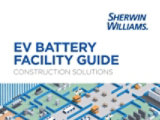
Download the EV Battery Plant Facility Coatings Guide
Explore the protective coating solutions curated and engineered for use in EV battery facilities.

Download the EV Battery Manufacturing Facility Protective Coatings Overview Sheet
Learn about the ways our industry-leading expertise and innovative coating solutions can help EV battery facility construction be safer, faster and simpler.
5. Moisture Vapor Transmission (MVT)
If the concrete floor is on-grade (directly in contact with the ground), it is essential to include a vapor barrier that will mitigate transmission of moisture through the porous concrete substrate. Without the application of a MVT floor coating product as part of your overall EV battery plant flooring system, the vapor transmission will eventually cause the delamination and disbondment of nearly any other floor coating, increase the relative humidity level in the room and may even lead to the growth of dangerous microbes and mold—all of which must be avoided in an EV battery clean room or dry room environment.
By conducting MVT tests and implementing the appropriate MVT mitigating floor coating solution, you can protect the floor of your EV battery plant from the harmful impacts of moisture vapor.
6. Type of Construction
The type of concrete, joints and other substrates in the EV battery facility also makes a difference. What kind of concrete was poured? Are the joints moving or non-moving? Are there metal parts of the substrate, like drain caps or utilities, that the floor coating must also cover? Will the floor (or surrounding floors) host equipment or machines that create vibrations, requiring a more flexible resinous floor coating?
These construction-related considerations will significantly direct your choice for EV battery manufacturing plant flooring.
7. Purpose of Area
The purpose of the specific area of the EV battery plant—how the space will be used on a day-to-day basis—will determine the level of durability and protection the floor coating should provide.
Most areas in an EV battery facility require flooring that is durable, easy to clean and resistant to wear and tear. Clean rooms and dry rooms need floor systems with additional moisture and static shock control. Operating, manufacturing and production areas must be designed for superior impact and abrasion resistance as well as smoothness and high visibility. Spaces with high traffic levels, like loading docks, need heavy duty floor coating solutions that can withstand the weight and vibrations of foot traffic, machines, equipment and more.
No matter the purpose of the environment, you can install a high performance resin flooring solution that meets your exact specifications.
8. Exposure Level
In an EV battery manufacturing and production facility, concrete floors can be exposed to a variety of hazardous materials and conditions, including chemicals, sanitizers, high temperatures, thermal shocks and washdowns. Carbon black powder is often used in EV production, and N-methyl-2-pyrrolidone (NMP) is the most common solvent for manufacturing cathode electrodes in the EV battery industry.
Exposure to harsh elements can severely damage the concrete substrate and create a dangerous working environment, so you must install a resinous flooring system that is resistant to these attacks. Ideally, find a floor coating solution that offers industry-leading durability in the face of EV battery facility conditions, such as exposure to carbon black powder or NMP chemical attacks.
9. Project Timing
If you are constructing a new EV battery plant or building an addition to an existing facility, the timing of the project will play into the type of floor coating system you install.
Green concrete, or concrete that was poured less than 28 days ago, has not been fully cured, which limits the resinous floor coating products you can apply. Some resinous floor coatings cannot be installed until after the concrete has dried completely. However, there is a significant range of resinous flooring that can be successfully applied as early as seven days after the green concrete has been poured.
To fast-track a new construction project, opt for a protective floor coating system designed for green concrete.
Contact Sherwin-Williams to Find the Best Flooring for Car Battery Plants
Sherwin-Williams resinous flooring solutions are specially formulated to meet the rigorous demands of the electric vehicle battery manufacturing industry. We offer a wide range of systems and can tailor a solution that fits the various demands of your EV battery plant.
Contact a Sherwin-Williams representative today to learn more about our EV battery manufacturing facility floor coating solutions.
Discover More
Industry Expertise and Innovation
See how we help customers find customized solutions for their project and application challenges.
System Lookup
Find out more about our innovative floor systems for a variety of industries.
FIND A SYSTEM